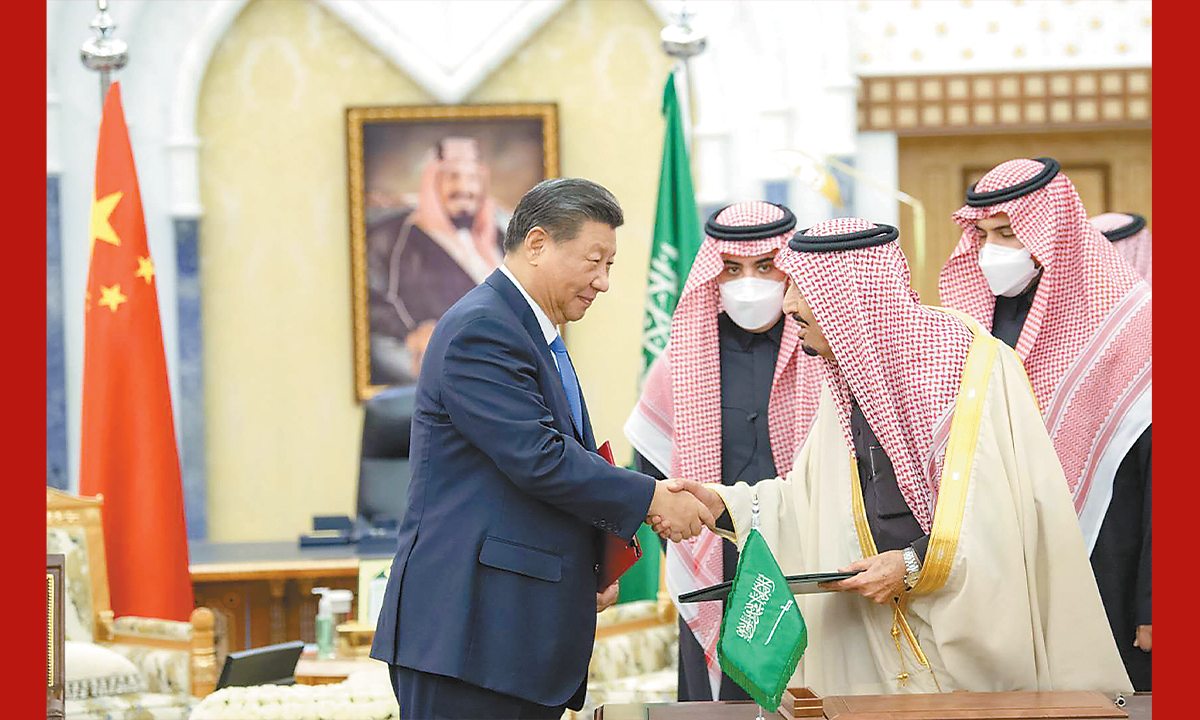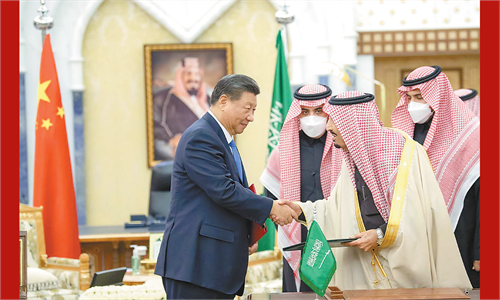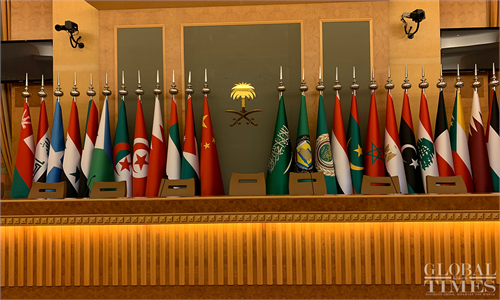Xi’s Mideast trip ushers in a new era of relations between China and Arab countries: FM

Chinese President Xi Jinping meets with King Salman bin Abdulaziz Al Saud of Saudi Arabia at Riyadh's al-Yamamah Palace in Saudi Arabia on December 8, 2022. Photo: Xinhua
Chinese top leader's trip to Saudi Arabia, the first visit to Middle East region since the 20th National Congress of the Communist Party of China (CPC), sets a benchmark for mutual respect, equality and win-win cooperation between China and Arab countries and will produce positive demonstration effect in building of a community with a shared future for mankind and promoting a new type of international relations, Chinese State Councilor and Foreign Minister Wang Yi said as Chinese President Xi Jinping's trip to Saudi Arabia came to a close.
Xi's landmark Mideast trip from Wednesday to Saturday ushered in a new era of all-round and in-depth development of relations between China and Arab states, between China and the GCC, and between China and Saudi Arabia, said Wang, also a member of the Political Bureau of the Communist Party of China (CPC) Central Committee.
Wang on Saturday briefed the media on President Xi's attendance at the first China-Arab States Summit and the China-Gulf Cooperation Council (GCC) Summit as well as his state visit to Saudi Arabia.
During his stay in Saudi Arabia, Xi has not only attended the first China-Arab States Summit and the China-GCC Summit, and paid a state visit to Saudi Arabia, but also held bilateral meetings with nearly 20 Arab leaders, Wang said, deeming Xi's Mideast trip as China's largest and highest-level diplomatic action with the Arab world since the founding of the People's Republic of China.
Calling Xi's attendance at the first China-Arab States Summit and the China-GCC Summit and his meetings with leaders of Saudi Arabia another great pioneering undertaking in China's diplomacy, Wang said it has demonstrated the strategic choice of China and Arab countries to strengthen solidarity and coordination in the face of global challenges.
Wang said Xi made a keynote speech at the first China-Arab States Summit, in which the Chinese president reviewed the time-honored history of friendly exchanges between the two sides, and refined the enduring spirit of the Chinese-Arab friendship that has spanned a thousand years.
Xi pointed out in his speech that solidarity and mutual assistance is a distinct feature of China-Arab friendship, equality and mutual benefit is a constant driver for the friendship, and inclusiveness and mutual learning is a key value inherent in the friendship, Wang said.
The Chinese president called on China and Arab states to foster a closer China-Arab community with a shared future, by staying independent and defending the common interests of both sides, focusing on economic development and promoting win-win cooperation, upholding regional peace and striving for common security, and increasing exchanges among civilizations to enhance mutual understanding and trust, Wang said.
Xi said China will work with the Arab side to advance eight major cooperation initiatives in areas including development support, food security, public health, green innovation, energy security, inter-civilizational dialogue, youth development, and security and stability, Wang noted.
Leaders attending the summit said the friendly relations between Arab states and China are based on mutual respect, equal cooperation and mutual benefit, Wang said.
The Arab world makes much of China's great development achievements and of its important role in the world, Wang noted, adding that a deepened Arab-China strategic partnership is conducive to better realizing fairness and justice, safeguarding world peace and development, and realizing the common aspirations of the Arab and Chinese people.
China and Arab states jointly issued the Riyadh Declaration of the First China-Arab States Summit, in which both sides agree to make all-out efforts to build a China-Arab community with a shared future in the new era, Wang noted.
The two sides also call for carrying out dialogue and communication between civilizations, preserving global cultural diversity, rejecting discrimination and prejudice against a particular civilization, and rejecting the theory of the clash of civilizations, Wang noted.
The declaration stressed a firm adherence to the one-China principle on the Taiwan question and issues related to Hong Kong and Xinjiang, Wang added.
Noting that the China-GCC Summit marks the first time leaders of China and GCC states got together, Wang said Xi's speech keenly expounded on how to establish the China-GCC strategic partnership from the four aspects of unity, development, security and civilization.
Xi stressed that the two sides should be partners for greater solidarity, common development, common security and cultural prosperity, Wang noted.
The Chinese president put forward five priority areas for China-GCC cooperation in the next three to five years, namely, setting up a new paradigm of all-dimensional energy cooperation, making new progress in finance and investment cooperation, expanding new areas of cooperation on innovation, science and technology, seeking new breakthroughs in aerospace cooperation, and nurturing new highlights in language and cultural cooperation, Wang added.
During his meetings with King Salman bin Abdulaziz Al Saud and Saudi Crown Prince Mohammed bin Salman Al Saud, Xi pointed out that China takes the development of its relations with Saudi Arabia as a priority in its overall foreign relations, in particular its diplomacy in the Middle East, and pushes for greater progress in the China-Saudi Arabia comprehensive strategic partnership, Wang said.
King Salman said that the two sides have reached important common understandings on many issues, and that what are China's interests are Saudi Arabia's interests as well, Wang noted.
The crown prince said that Saudi Arabia firmly supports China's measures and efforts for deradicalization, and that more Chinese companies are welcomed to take an active part in the industrialization process of Saudi Arabia, Wang noted.
Both sides agreed to hold a meeting between the two heads of state by turns every two years, Wang said, adding that during Xi's visit, the leaders of the two countries agreed to synergize the Belt and Road cooperation and Saudi Arabia's Vision 2030.
Wang said Xi actively promoted the spirit of the 20th CPC National Congress, elaborated on the Chinese path to modernization and the purpose of China's foreign policy, and underlined that China will firmly pursue a mutually beneficial strategy of opening up, and create new opportunities for Arab states and all other countries with China's new development.
Noting that the Palestinian issue bears on peace and stability in the Middle East and concerns international fairness and justice, Wang said Xi reiterated that China firmly supports the establishment of an independent State of Palestine, supports Palestine in becoming a full member of the United Nations, and will continue to provide humanitarian assistance to Palestine.
Arab leaders reiterated their countries' firm adherence to the one-China principle and unswerving support for China in safeguarding its core interests, Wang added.


